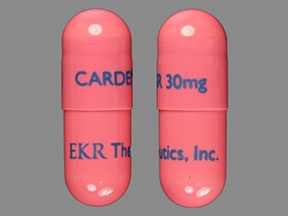Cardene SR Side Effects
Generic name: nicardipine
Medically reviewed by Drugs.com. Last updated on Jun 22, 2023.
Note: This document contains side effect information about nicardipine. Some dosage forms listed on this page may not apply to the brand name Cardene SR.
Applies to nicardipine: oral capsule. Other dosage forms:
Serious side effects of Cardene SR
Along with its needed effects, nicardipine (the active ingredient contained in Cardene SR) may cause some unwanted effects. Although not all of these side effects may occur, if they do occur they may need medical attention.
Check with your doctor immediately if any of the following side effects occur while taking nicardipine:
More common
- Arm, back, or jaw pain
- chest pain or discomfort
- chest tightness or heaviness
- fast or irregular heartbeat
- nausea
- palpitations
- shortness of breath
- sweating
- swelling of the legs
Less common
- Shakiness
- swelling
Rare
- Blurred vision
- cold hands and feet
- cold sweats
- confusion
- cough or hoarseness
- difficulty swallowing
- dizziness, faintness, or lightheadedness when getting up from a lying or sitting position suddenly
- extra heartbeat
- fever or chills
- hives
- increase in frequency of urination
- itching
- lower back or side pain
- painful or difficult urination
- puffiness or swelling of the eyelids or around the eyes, face, lips, or tongue
- skin rash
- unusual tiredness or weakness
- wheezing
Get emergency help immediately if any of the following symptoms of overdose occur while taking nicardipine:
Symptoms of overdose
- Sleepiness
- slurred speech
Other side effects of Cardene SR
Some side effects of nicardipine may occur that usually do not need medical attention. These side effects may go away during treatment as your body adjusts to the medicine. Also, your health care professional may be able to tell you about ways to prevent or reduce some of these side effects.
Check with your health care professional if any of the following side effects continue or are bothersome or if you have any questions about them:
More common
- Feeling of warmth
- headache
- lack or loss of strength
- redness of the face, neck, arms and occasionally, upper chest
Less common
- Acid or sour stomach
- belching
- burning, crawling, itching, numbness, prickling, "pins and needles", or tingling feelings
- difficulty in moving
- dry mouth
- heartburn
- indigestion
- joint pain
- muscle aching or cramping
- muscle pains or stiffness
- rash
- stomach discomfort, upset, or pain
- swollen joints
Rare
- Changes in vision
- constipation
- continuing ringing or buzzing or other unexplained noise in ears
- decreased interest in sexual intercourse
- difficult or labored breathing
- discouragement
- fear or nervousness
- feeling of constant movement of self or surroundings
- feeling sad or empty
- hearing loss
- inability to have or keep an erection
- increase in body movements
- irritability
- lack of appetite
- loss of interest or pleasure
- loss in sexual ability, desire, drive, or performance
- nervousness
- pain or tenderness around eyes and cheekbones
- runny nose
- sensation of spinning
- sneezing
- sore throat
- stuffy nose
- trouble concentrating
- trouble sleeping
For Healthcare Professionals
Applies to nicardipine: compounding powder, intravenous solution, oral capsule, oral capsule extended release.
General
The most common adverse reactions were consequences of vasodilation.[Ref]
Cardiovascular
Common (1% to 10%): Hypotension, tachycardia, flushing, angina increased, palpitations, vasodilatation
Uncommon (0.1% to 1%): Sustained tachycardia, abnormal ECG, postural hypotension, myocardial infarct
Frequency not reported: Angina pectoris, atrioventricular block, ST segment depression, inverted T wave, deep vein thrombophlebitis, sinus node dysfunction, atrial fibrillation, exertional hypotension, pericarditis, heart block, ventricular tachycardia, peripheral vascular disorder, ventricular extrasystoles[Ref]
Nervous system
Very common (10% or more): Headache (up to 21%)
Common (1% to 10%): Dizziness, somnolence, paresthesia
Uncommon (0.1% to 1%): Syncope, tremor
Frequency not reported: Confusion, hypertonia, tinnitus, cerebral ischemia, vertigo, hyperkinesia[Ref]
Gastrointestinal
Common (1% to 10%): Nausea/vomiting, nausea, dyspepsia, dry mouth
Uncommon (0.1% to 1%): Constipation, vomiting, diarrhea
Frequency not reported: Sore throat[Ref]
Other
Common (1% to 10%): Asthenia, other edema
Uncommon (0.1% to 1%): Malaise, pain, chest pain, face edema
Frequency not reported: Fever, ear disorder, atypical chest pain, hot flashes[Ref]
Dermatologic
Common (1% to 10%): Rash
Uncommon (0.1% to 1%): Sweating increased[Ref]
Metabolic
Common (1% to 10%): Pedal edema
Frequency not reported: Hypophosphatemia, peripheral edema[Ref]
Musculoskeletal
Common (1% to 10%): Myalgia
Frequency not reported: Neck pain, arthralgia[Ref]
Psychiatric
Uncommon (0.1% to 1%): Nervousness, insomnia, abnormal dreams
Frequency not reported: Depression, anxiety[Ref]
Genitourinary
Uncommon (0.1% to 1%): Nocturia, urinary frequency increased
Frequency not reported: Urinary frequency, impotence[Ref]
Respiratory
Uncommon (0.1% to 1%): Dyspnea
Frequency not reported: Respiratory disorder, decreased oxygen saturation, rhinitis, sinusitis[Ref]
Ocular
Uncommon (0.1% to 1%): Vision blurred
Frequency not reported: Conjunctivitis, vision abnormal[Ref]
Immunologic
Frequency not reported: Infection, allergic reaction[Ref]
Hematologic
Frequency not reported: Thrombocytopenia[Ref]
Hepatic
Frequency not reported: Abnormal liver chemistries[Ref]
More about Cardene SR (nicardipine)
- Check interactions
- Compare alternatives
- Drug images
- Dosage information
- During pregnancy
- Drug class: calcium channel blocking agents
- Breastfeeding
Patient resources
Other brands
Professional resources
Other brands
Other formulations
Related treatment guides
References
1. Product Information. Cardene (nicardipine). Syntex Laboratories Inc. 2002;PROD.
Further information
Always consult your healthcare provider to ensure the information displayed on this page applies to your personal circumstances.
Some side effects may not be reported. You may report them to the FDA.

